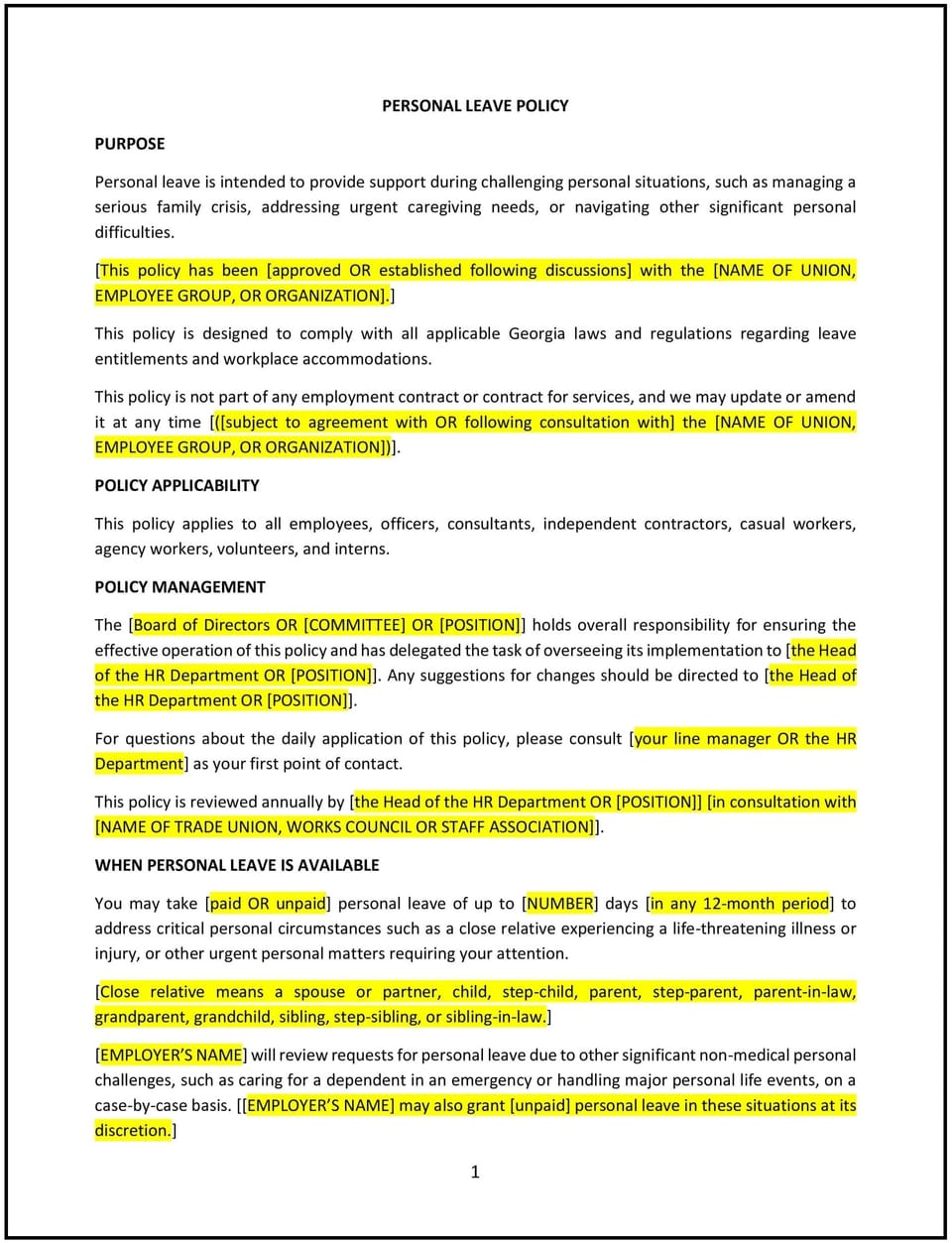Personal leave policy (Georgia): Free template

Personal leave policy (Georgia)
This personal leave policy is designed to help Georgia businesses provide employees with time off to address personal matters, emergencies, or other non-work-related needs. The policy outlines eligibility, leave procedures, and conditions to ensure clarity and fairness.
By implementing this policy, businesses can support employee well-being, foster a positive work environment, and maintain operational efficiency.
How to use this personal leave policy (Georgia)
- Define eligibility: Specify which employees are eligible for personal leave, including any requirements for tenure or employment status.
- Set leave duration: Clearly outline the maximum duration of personal leave and whether it is paid or unpaid.
- Establish notification procedures: Require employees to provide as much advance notice as possible and submit leave requests in writing.
- Address documentation: Specify any documentation requirements, such as medical notes or other evidence supporting the leave request.
- Clarify return-to-work conditions: Include guidelines for employees returning from personal leave, such as advance notice or check-ins with HR.
- Protect against misuse: Outline expectations for the appropriate use of personal leave and potential consequences for misuse.
- Maintain confidentiality: Emphasize that details about leave requests will be handled discreetly to protect employee privacy.
- Review and update regularly: Periodically assess the policy to ensure it reflects changes in Georgia workplace practices or organizational priorities.
Benefits of using this personal leave policy (Georgia)
Implementing this policy provides several advantages for Georgia businesses:
- Supports employee well-being: Personal leave options help employees address important matters without undue stress.
- Promotes fairness: Consistent guidelines ensure equitable treatment of all employees requesting leave.
- Enhances morale: A supportive approach to personal leave fosters trust and loyalty among employees.
- Reduces absenteeism: Clear policies encourage employees to manage their leave responsibly and return promptly.
- Reflects Georgia-specific needs: Tailoring the policy to local workplace practices ensures its relevance and practicality.
Tips for using this personal leave policy (Georgia)
- Communicate clearly: Share the policy with employees during onboarding and make it easily accessible.
- Monitor leave usage: Track personal leave trends to identify potential issues or areas for improvement.
- Provide flexibility: Consider individual circumstances when approving personal leave requests to show empathy and support.
- Address coverage: Develop contingency plans to manage workloads during employee absences.
- Update as needed: Revise the policy to reflect feedback from employees or changes in organizational priorities.
Q: Who is eligible to take personal leave?
A: Eligibility should be based on factors such as tenure, employment status, and the business’s specific criteria outlined in the policy.
Q: Is personal leave paid or unpaid?
A: Businesses should specify in the policy whether personal leave is paid or unpaid and outline any conditions for pay.
Q: How should employees request personal leave?
A: Employees should submit written leave requests to their supervisor or HR as far in advance as possible, providing necessary details.
Q: What documentation is required for personal leave?
A: Documentation requirements depend on the nature of the leave and may include medical notes or other relevant evidence.
Q: How should businesses handle workload coverage during personal leave?
A: Businesses should develop contingency plans, such as redistributing tasks among team members, to manage workloads effectively.
Q: Can employees extend their personal leave?
A: Employees should request extensions in writing and provide a valid reason for the additional time off, subject to management approval.
Q: How often should this policy be reviewed?
A: The policy should be reviewed annually or as needed to reflect changes in Georgia workplace practices or organizational goals.
This article contains general legal information and does not contain legal advice. Cobrief is not a law firm or a substitute for an attorney or law firm. The law is complex and changes often. For legal advice, please ask a lawyer.


